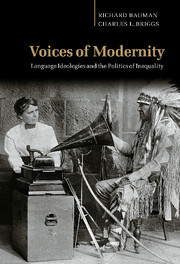Book contents
- Frontmatter
- Contents
- Preface
- 1 Introduction
- 2 Making language and making it safe for science and society: from Francis Bacon to John Locke
- 3 Creating modernity's others in seventeenth- and eighteenth-century England: antiquarian and philological inflections
- 4 The critical foundations of national epic and the rhetoric of authenticity: Hugh Blair and the Ossian controversy
- 5 Language, poetry, and Volk in eighteenth-century Germany: Johann Gottfried Herder's construction of tradition
- 6 Scientizing textual production in the service of the nation: the Brothers Grimm and Germanic philology
- 7 The making of an American textual tradition: Henry Rowe Schoolcraft's Indian researches
- 8 The foundation of all future researches: Franz Boas's cosmopolitan charter for anthropology
- 9 Conclusion
- References
- Index
3 - Creating modernity's others in seventeenth- and eighteenth-century England: antiquarian and philological inflections
Published online by Cambridge University Press: 22 September 2009
- Frontmatter
- Contents
- Preface
- 1 Introduction
- 2 Making language and making it safe for science and society: from Francis Bacon to John Locke
- 3 Creating modernity's others in seventeenth- and eighteenth-century England: antiquarian and philological inflections
- 4 The critical foundations of national epic and the rhetoric of authenticity: Hugh Blair and the Ossian controversy
- 5 Language, poetry, and Volk in eighteenth-century Germany: Johann Gottfried Herder's construction of tradition
- 6 Scientizing textual production in the service of the nation: the Brothers Grimm and Germanic philology
- 7 The making of an American textual tradition: Henry Rowe Schoolcraft's Indian researches
- 8 The foundation of all future researches: Franz Boas's cosmopolitan charter for anthropology
- 9 Conclusion
- References
- Index
Summary
Introduction
Francis Bacon has a secure place in the pantheon consecrated by intellectual historians to the makers of modernity. As we have discussed in Chapter 2, Bacon's bold heralding of the charter for his Natural Philosophy insistently proclaims the need for a decisive break with the past if the quest for genuine knowledge is to be placed on its proper course. An essential part of Bacon's scientific program, we recall, is the necessity of direct experience and the exercise of individual reason in the pursuit of true knowledge, and the concomitant distrust of traditional authority, mediated by texts and testimonies: “First, then, away with antiquities, and citation or testimonies of authors, and also with disputes and controversies and differing opinions – everything, in short, which is philological” (Bacon 1968 [1857–74] IV: 254). By oft-cited pronouncements such as these, Bacon created – or portrayed himself as creating – the kind of gap between the past and the present that is constitutive of the advent of modernity, in this instance between a supernaturalist worldview resting on traditional authority and a naturalist worldview resting upon the exercise of reason.
In the preceding pages, we have traced some of the linguistic inflections of Bacon's proclaimed epistemic break in science, and followed them as they were extended and transformed through the work of John Locke and others.
- Type
- Chapter
- Information
- Voices of ModernityLanguage Ideologies and the Politics of Inequality, pp. 70 - 127Publisher: Cambridge University PressPrint publication year: 2003

